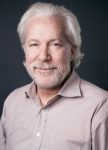Rabbi Irwin Kula speaks in Vancouver on Sept. 16 at FEDtalks, the opening event of the Jewish Federation of Greater Vancouver annual campaign. (photo from JFGV)
The world is in a time of historic shifts and the way we interpret and respond to what is happening can make each individual a player in this civilizational drama.
This is the promise of Rabbi Irwin Kula, who will speak in Vancouver on Sept. 16 at FEDtalks, the opening event of the Jewish Federation of Greater Vancouver annual campaign. Kula is co-president of Clal, the National Jewish Centre for Learning and Leadership.
“We are living in one of the most dramatic, exciting times in human history,” Kula told the Independent in a telephone interview. “Whenever one lives in a dramatic transitional moment, the call to responsibility is also dramatic. The fear and the anxiety that we are feeling is all understandable. But managing the fear, managing the anxiety and, therefore, managing some of the loss that comes in these great moments of transition, is how we move on the journey.”
Kula promises audience members more than an interesting talk.
“Anyone who is going to be in that room, anyone who is willing to speak about it this way, really has an opportunity to be a part of not only the solution but one of the great adventures in the human drama right now,” he said.
At Clal, Kula is part of a team that is “reimagining Judaism for this era.”
“And not only Judaism, but religion in general,” Kula said. “What is religion and Judaism going to look like in an information age? In an age of globalization? In an age when the borders and boundaries of their identities are more permeable?”
Kula is an eighth-generation rabbi and holds a degree in philosophy. He has served congregations in Jerusalem and St. Louis, Mo., and, over the last 30 years, has been involved with Clal, which describes itself as a “do-tank” – “The thinking actually has to apply to people’s doing,” he explained.
Kula works “at the intersection of religion, innovation and human flourishing,” he said. “Those are the lenses I use.”
Kula analyzes how information, entertainment, media, retail and other components of society are affected by innovation. In his 2007 book Yearnings: Embracing the Sacred Messiness of Life, Kula considers the relationship between what we desire and how we live.
“Yearnings is a fancy word for desires,” he said. “The central insight in the book is that what animates us, what animates our lives, are our desires. They are sources of great wisdom for who we are as human beings. We know our most intense desires – our desire for love, our desire for the truth, our desire for meaning, our desire for happiness, our desire to be creative and have a purpose and to contribute.… The interesting thing about looking at our desires is, the more one can understand our desires, the wiser our lives are.”
Whatever the day’s headlines, Kula said, maintaining optimism is critical to making positive change in the world.
“Being an optimist doesn’t mean you have to be Pollyanna,” he said. “You can be an optimist and be 51-49 about it. The difference between being a 51-49 optimist and 51-49 the other way may be the biggest difference of all.”
And when the nightly news brings stories of authoritarian ascendancy or other alarming developments, the long view is an antidote.
“I use a long-term, macro-evolutionary take,” said Kula. “This is where Martin Luther King, I think, is right. The arc of history bends toward justice. But it doesn’t bend linearly. It’s not one plus one plus one plus one. It’s sometimes two steps forward and a step backward. We are in now a very, very significant moment of transition. There’s a lot of ways to talk about that transition – postmodern, information age, technological age – and all of the changes are hard to metabolize. So, it takes a very serious responsibility for elites and cultural creatives and people who experience themselves at the cutting edge of these changes to take very seriously the costs and pains and dislocation of these changes for different people. That is what I think we are all called to do.”
People may look at the state of the world and feel helpless or hopeless. But the better response, Kula said, is not only to acknowledge the ways in which we might affect improvements, but also to take individual responsibility for the situation.
“Maimonides, the great Jewish philosopher, said, in the face of trauma and in the face of political tragedies, the first thing to ask is how am I complicit in what is transpiring,” said Kula. “Not in a giant moral drama of blaming, because, if we are actually interdependent … then what’s happening with people with whom we deeply disagree is connected to us. It’s not some other, evil person over there.”
This is not to say there is not evil in the world, he cautions. But, asserting that those with whom we disagree are evil can potentially misallocate cause.
“In America, there aren’t 60 million evil people who voted for Trump that want America to be destroyed and become a homophobic, primitive, psychologically regressive place in the world,” Kula said. “It behooves us, says Maimonides, to address very seriously what have I missed and, therefore, perhaps been complicit in allowing this to emerge?”
Courage and a sense of adventure can help us navigate times like these.
“If we mitigate a little bit the fear and just stand at that burning bush and not be so scared, know there is tremendous possibility,” he said.
For tickets to FEDtalks, at the Vancouver Playhouse, visit jewishvancouver.com.

